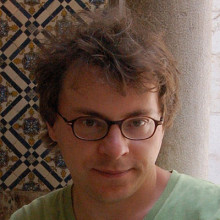Polish literature

Piotr Paziński
Born in 1973, Paziński is a writer, journalist, essayist, literary critic and translator. He has written a monograph called Labyrinth and Tree: Studies of James Joyce’s Ulysses, and also a guidebook to Dublin. He is editor-in-chief of the journal Midras and jointly organises the “Jewish Book Days” literary festival.
He is an active promoter of Jewish cultural and religious traditions. His novel The Boarding House won the Paszport prize awarded by the weekly news magazine Polityka and the European Union Literary Prize. It is a semi-autobiographical story about the collapse of a bygone world and an effort to trace the family past. The narrator returns to the boarding house outside Warsaw, where many years ago he used to come and visit his grandmother; like other residents of the rest home, she was a Jew who had survived the Holocaust. Once buzzing with life, now the home is more and more subdued as its residents die off. Here the past overlaps with the present, and the dead accompany the living as they summon up the irretrievable past in their reminiscences. There are not many of them left now. They collect faded postcards, letters, photographs and other bits of junk. They have ideological arguments centring on Zionism, communism, issues to do with assimilation or, most broadly, they talk about the history of the Polish Jews, picking out the most dramatic themes (“the fate of the Jews crushes you like a boulder”). The narrator is “the last in the chain of generations”, who only knows the Holocaust at second hand. He pays off his ancestors’ debts by becoming the depository of their memories. Ultimately, in his next book, Bird Streets, which consists of four short stories, Paziński remains true to the lyricism of The Boarding House as well as to its Jewish subject matter. Here there is a funeral procession that wanders about a labyrinthine cemetery and slips into “a branch line of time” (The Cortège); a little old man who disappears in mysterious circumstances, and whose trail leads to a pre-war phone book found in a second-hand bookstore on the point of being closed down (The Little Old Man); a commemoration of the outbreak of the Warsaw Ghetto Uprising, which gives Izaak Feldwurm an excuse to reminisce (Izaak Feldwurm’s Manuscript); and some harrowing scenes of watching over the dead body of a friend, surrounded by objects that trigger all sorts of memories (The Apartment). The consistent theme in this collection is death and a world that is becoming extinct, as we are reminded if only by street names that no longer exist, such as Orla, Gęsia, Wronia, or Kacza (these are the “bird streets” of the title, meaning respectively, “Eagle”, “Goose”, “Crow” and “Duck”). Here grief and nostalgia are shot through with subtle irony. In Paziński’s prose, which relies above all on spinning out some existing literary themes, there are some extremely clear echoes of inspiration from Schulz. As Jan Gondowicz says: “Piotr Paziński’s metaphysical narratives hover on the edges of what is called ‘impoverished reality’. They draw on the magic of postmemory, which adds legends to the world of the survivors. The empty space left by their passing is filled by the myth-creating work of the imagination.”
My past lies deep inside me, but whenever I try to reach it, I come upon a hollowed-out void, as if I’d been born yesterday, and everything that happened before then was just a jumble of shadowy images, decomposed and scattered into atomic specks. … The pressure of these accumulated images creates the illusion of memory, and just like lots and lots of photographs, becomes a substitute for life.
– Piotr Paziński
BIBLIOGRAPHY
Fiction:
- Pensjonat [The Boarding House], Warsaw: Wydawnictwo Nisza, 2009.
- Ptasie ulice [Bird Streets], Warsaw: Wydawnictwo Nisza, 2013.
Other books:
- Labirynt i drzewo. Studia nad Ulissesem Jamesa Joyce'a [Labyrinth and Tree: Studies of James Joyce’s Ulysses], Wydawnictwo Austeria, 2005.
- Dublin z Ulissesem. Wraz ze słownikiem bohaterów Ulissesa [Dublin with Ulysses: including a dictionary of words used in Ulysses], Warsaw: Czuły Barbarzyńca Press, 2008.
Translations:
Czech:
- Letní byt [Pensjonat], trans. Lucie Zakopalová, Prague: Havran, 2012
German:
- Die pension [Pensjonat], trans. Benjamin Voelkel, Berlin: edition.fotoTapeta, 2014
Serbian:
- Pansion [Pensjonat], trans. Snežana Dukanović, Novi Sad: Budućnost, 2013